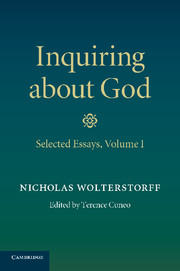Book contents
- Frontmatter
- Contents
- Editor's introduction
- Acknowledgments
- Introduction
- 1 Analytic philosophy of religion: retrospect and prospect
- 2 Is it possible and desirable for theologians to recover from Kant?
- 3 Conundrums in Kant's rational religion
- 4 In defense of Gaunilo's defense of the fool
- 5 Divine simplicity
- 6 Alston on Aquinas on theological predication
- 7 God everlasting
- 8 Unqualified divine temporality
- 9 Suffering love
- 10 Is God disturbed by what transpires in human affairs?
- 11 The silence of the God who speaks
- 12 Barth on evil
- 13 Tertullian's enduring question
- Bibliography
- Index
1 - Analytic philosophy of religion: retrospect and prospect
Published online by Cambridge University Press: 04 May 2010
- Frontmatter
- Contents
- Editor's introduction
- Acknowledgments
- Introduction
- 1 Analytic philosophy of religion: retrospect and prospect
- 2 Is it possible and desirable for theologians to recover from Kant?
- 3 Conundrums in Kant's rational religion
- 4 In defense of Gaunilo's defense of the fool
- 5 Divine simplicity
- 6 Alston on Aquinas on theological predication
- 7 God everlasting
- 8 Unqualified divine temporality
- 9 Suffering love
- 10 Is God disturbed by what transpires in human affairs?
- 11 The silence of the God who speaks
- 12 Barth on evil
- 13 Tertullian's enduring question
- Bibliography
- Index
Summary
My project in this essay is to offer a broad characterization of recent philosophy of religion in the analytic tradition of contemporary philosophy, then to offer an account of how it got that way and, finally, to offer some proposals for the future. Not predictions, but proposals.
I will assume that the reader knows, well enough for the purposes at hand, what I am referring to when I speak of the analytic tradition of contemporary philosophy. In particular, I will assume that the reader has not fallen for that superficial but popular view that what defines the analytic tradition is the high priority given to rigor of thought and clarity of expression. Defenders of the analytic tradition often cite those priorities as among its glories; opponents cite the same priorities as making it trivial. And it's true that analytic philosophers have given an unusually high priority to rigor of thought and clarity of expression. But their reasons for doing so have not been reasons of taste but of philosophical conviction; those reasons are of more importance than the valuation itself.
My own view is that the identity of the analytic tradition is a narrative, rather than a purely systematic, identity. What makes a philosopher an analytic philosopher is that he places himself within a certain story line of philosophy in the twentieth century. Of course one may try, in one's own work, to amalgamate story lines.
- Type
- Chapter
- Information
- Inquiring about God , pp. 17 - 34Publisher: Cambridge University PressPrint publication year: 2010
- 1
- Cited by



